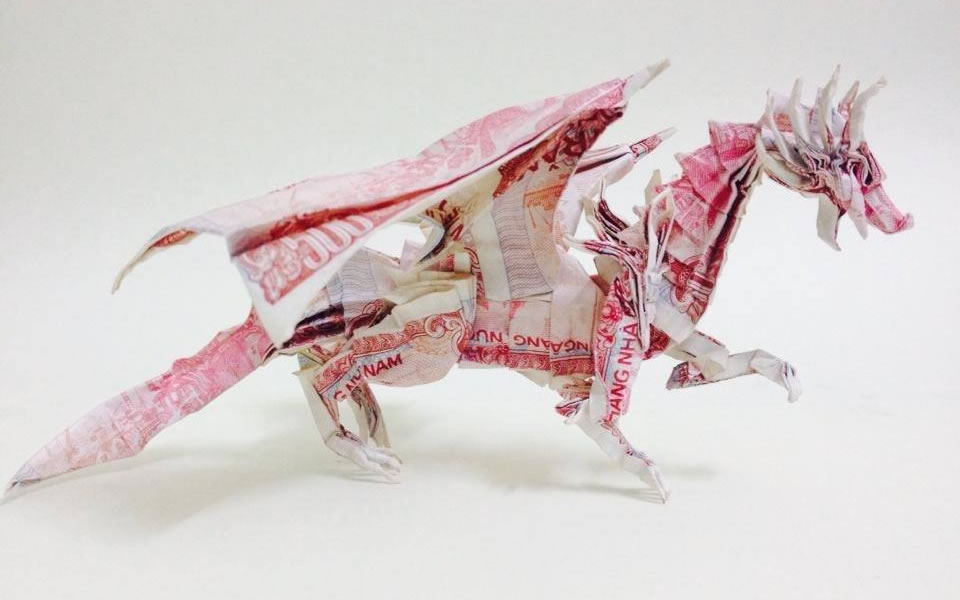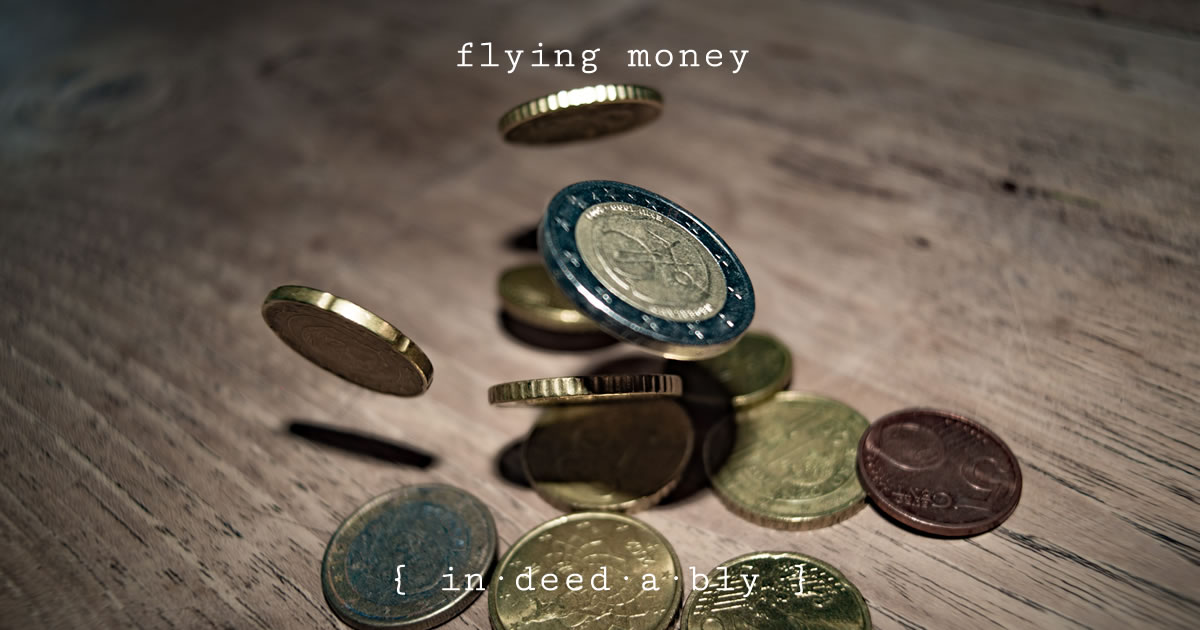Did you know that paper money originated as a knee jerk reaction to an unintended consequence of a poorly thought through government policy?
It was around the year 812, and China was running out of copper coins.
A recent change to the taxation system allowed taxes to be paid in coin, rather than the traditional goods-in-kind. The result was a huge surge in demand for coins.
Fearing civil disorder and rioting, Emperor Xianzong forbade merchants from removing coins from the main cities.
This created a huge liquidity problem for merchants.
Impacting commerce.
Hindering trade.
How could a merchant purchase tea in Sichuan, to sell at a profit in the markets of Chang’an, if they couldn’t transport coins?
The emperor reluctantly approved the creation of paper bills as a substitute for copper coins. These bills were colloquially known as “flying money”.
Coins were exchanged for government-issued bills of exchange in one city. The merchant would travel to the next city, where the bills were swapped for the equivalent value of local coins.
Coins remained available in the cities. The liquidity problem was solved.
For a while.

Flying money. Image credit: Đỗ Anh Tú.
A crusade for consumer safety
Roughly three hundred years later, the Crusaders had conquered Jerusalem.
Teeming hordes of religious tourists, driven by peer pressure and the fear of missing out, suddenly flooded to see the newly accessible sites.
Then as now, tourists needed to pay for all their food and accommodation far from home. This made them a tempting targets for thieves and robbers.
How could travelling long distances carrying lots of money be made safer?
Having won the war, a group of ageing Knights found themselves with time on their hands. They dedicated themselves to helping those in need, including protecting pilgrims during their journey.
This group later became known as the Knights Templar.
Some of the Templars traded swords for ledgers, establishing one of the first international banking networks.
Tourists could deposit funds with the Templars at home, and then withdraw them once they reached the Holy Land.
The personal safety problems of transporting money over large distances were resolved.
Unlike Chinese “flying money”, the Templar system was not underwritten by a national government.
Instant gratification, delayed payment
Roll forward another two hundred years to the 13th century. Trade thrived amongst the Italian city-states, but the security risk of carrying large sums of money remained.
How could a merchant settle a bill, without physically delivering the money in person?
A long forgotten banker in the Republic of Venice formalised the ancient tradition of IOUs into an early version of personal cheques.
The cheque allowed a person to issue a pre-authorised instruction to their bank for the release of funds to a third party on demand.
A merchant could now safely pay for goods without carrying around large quantities of money.
Trading partners could cash cheques at their leisure, safe in the knowledge that the merchant’s bank would honour the demand.
Unlike the Templar system, the bank would release funds to anyone who presented a valid cheque, rather than just to the account holder or their trusted agent.
Premise of a promise
Just over a hundred years later, in the neighbouring city-state of Florence, the Medici family founded what would become Europe’s largest bank.
A predictable shortcoming had emerged with the humble cheque.
If the merchant’s account held insufficient funds to cover a payment, then the bank would refuse to honour the cheque.
That created a problem for the person presenting the cheque. They had already parted with the goods that the cheque was supposed to pay for.
Chasing debtors was a hassle. Debt collection is a messy unpleasant business, then as now.
How could a trading partner trust that a merchant actually had the funds to make a purchase?
The Medici are famous for inventing the double-entry bookkeeping system, getting themselves elected Pope, and sponsoring the Renaissance. One of their less-heralded achievements was the creation of the letter of credit.
Similar to cheques, a letter of credit allowed a merchant to purchase goods today on the promise of payment later.
The main difference was that a letter of credit is underwritten by a trusted authority, like the Medici bank. This guaranteed that payment would be honoured, irrespective of the merchant’s account balance.
Unlike the Venetian cheque, the letter of credit reduced the risk of non-payment for the trading partner. It was based upon the financial strength of the underwriter, rather than the merchant.
The end of the Pony Express
Four hundred years later Western Union had created a telegraph network spanning the United States. They commercialised Samuel Morse’s invention, providing virtually instantaneous communication over vast distances.
Gone were the days that the best informed person was the one who owned the fastest horse.
One of Western Union’s employees was Thomas Edison. He invented the stock market ticker, a device delivered stock prices in near real time to brokerage firms throughout the country. More than a century before the internet existed.
How could the financial payments process, which had changed little since the days of Medici, be sped up?
Western Union applied their telegraph technology to making instant money transfers.
In New York, a customer could walk into a Western Union shopfront and deposit funds for a nominated recipient.
Moments later the recipient could walk into a Western Union shopfront in San Francisco, identify themselves, and walk out carrying the transferred sum!
Is innovation an illusion?
What I find fascinating about the history of payment innovation is how little there has actually been.
Western Union sped up the process pioneered by the Templars more than 700 years earlier.
Paypal have simply made it more convenient.
In the 1940s credit cards forever changed how we shop. They applied Medici’s 500 year old settlement guarantee concept to merchants who sold directly to individuals.
Same idea, just a broader application.
Cryptocurrencies promise an alternative solution to the problem that the Tang Dynasty’s “flying money” solved more than 1200 years ago.
Like many of the financial innovations that followed, blockchain ledgers add value by addressing risk issues associated with using money.
However, cryptocurrencies do so at the cost of removing the guaranteed backing that granted the original “flying money” and the Medici’s letter of credit their value.
Absent of this, both were just valueless pieces of paper decorated with empty words, like a cheque that bounces.
Risky for merchants to accept as a medium of exchange.
Riskier still to hold as an asset, the value backed by nothing more than hope.
The unbanked
According to the World Bank, in 2018 globally there were 1.7 billion adults without access to a bank account.
These people benefit from none of the advances in monetary security and contract certainty that have occurred since the Tang Dynasty more than a millennia ago.
With no choice but to pay cash for everything, they are constantly at risk of being robbed.
However over one billion of those unbanked people do have access to a mobile phone.
How could the unbanked gain access to payment services, when the nearest bank branch is often beyond viable commuting distance?
Mobile money is one area of payment innovation that has the potential to make a huge impact on the lives of hundreds of millions of people without access to a bank account.
It combines the safety aspects of depositing funds with the Templars, the convenience of Venetian cheques, the contract certainty of a Medici letter of credit, and the speed of Western Union.
Mobile phone operators have established networks consisting of hundreds of thousands of registered agents. These agents are typically small businesses like convenience stores or newsagents. The type of place where you might see a Lebara mobile sign, while walking around London.
A person signs up for a mobile money account, which gets linked to their mobile phone number.
From that point onwards they can convert cash to or from mobile money using any registered agent. That mobile money can then be used to pay bills, or transfer money to other people. All via SMS messages.
Wherever they live.
Using existing infrastructure.
And technology they already have access to.
All without a bank account.

A long commute to the bank. Image credit: jbauer-fotographie.
Carbolic Smoke Ball Company
Mobile money provided a simple solution to a complex systemic problem.
That got me thinking about how we each manage our own money.
The financial services industry is full of people who derive their livelihoods from adding unnecessary layers of complexity and fees over what are fundamentally very simple transactions.
My old Introductory Business Law professor once told us the story of the Carbolic Smoke Ball Company case. This case established a simple framework for determining the existence of a legally binding contract between two parties. There needed to be:
- an offer
- acceptance
- consideration
- and an intention to create legal relations.
At their heart, the majority of monetary transactions are similarly simple.
- A buyer offers to purchase a good or service for a given price.
- A seller accepts the buyer’s offer, agreeing to provide that good or service at that price.
- The buyer commits to pay the agreed price, either immediately or at some point in the future.
The method that the buyer chooses to perform that payment may vary, ranging from “flying money” through to mobile money delivered via SMS message.
However, the elements of the transaction are fundamentally the same today as they were during the Tang Dynasty.
Much is written about our living in a sophisticated fast-paced world. Where innovation continually disrupts the status quo.
Revolutionary innovation is rarer than a unicorn with sunburn.
Incremental innovation is gradual, changing the way we do things but not the things that we do.
Most things badged as innovation are really just marketing window dressing. Functionally the same, but with “new and improved” red go-faster stripes painted down the sides.
There are some simple things that just don’t change. By identifying those, we can focus our attention on things that matter. This enables us to avoid being distracted by the latest shiny packaging wrapped around those same old ideas.
References
- Barclays (2016), ‘From the archives: the evolution of the cheque‘
- Court of Appeal (1892), ‘Carlill v Carbolic Smoke Ball Co [1893] 1 Q B 256‘
- Chironga, M., Cunha, L., De Grandis, H., and Kuyoro M. (2018), ‘African retail banking’s next growth frontier’, McKinsey & Company
- Chironga, M., Cunha, L., De Grandis, H., and Kuyoro M. (2018), ‘Roaring to life: Growth and innovation in African retail banking’, McKinsey & Company
- Dahir, A.L. (2018) ‘Mobile money is the key to growing Africa’s banking sector’, Quartz Africa
- Edology (2019), ‘3 Medici banking innovations we still use today‘
- Gale Encyclopedia of U.S. Economic History (2019), ‘Western Union Corporation’, Encyclopedia.com
- Goetzmann, W.N. (2017), ‘Money Changes Everything: How Finance Made Civilization Possible‘, Princeton University Press
- Harford, T. (2017), ‘The warrior monks who invented banking’, BBC News
- History.com (2019), ‘Knights Templar‘
- Silkroad Foundation (2000), ‘Paper money‘
- The World Bank (2017), ‘The Global Findex database‘
- The World Bank (2018), ‘Financial Inclusion on the Rise, But Gaps Remain, Global Findex Database Shows‘
- Theobald, U. (2016), ‘feiqian 飛錢, bills of exchange’, ChinaKnowledge.de
- Vodafone (2019), ‘What is M-Pesa?‘
- Western Union (2008), ‘History‘


weenie 27 May 2019
Thanks very much for the interesting history lesson about money!
And the innovation about mobile money, I had no idea that existed, although I knew people could donate to charities via text so I assume it’s something linked to that?
I’m not sure I’m anywhere near ready to embrace cryptocurrency, still prefer cash to contactless. Am more of a fan of the chip and pin and even the occasional cheque when required!
{in·deed·a·bly} 27 May 2019 — Post author
Thanks weenie.
Donations via text in the UK is a bit different to mobile money. Here you’re essentially sending a premium rate text, which has you billed for a predetermined amount in a similar manner to the voting process for those reality television shows. If you’re on a pay monthly plan then your bank account gets charged that amount as part of your next bill payment.
Mobile money uses free text messages to make bill payments and transfers. The initiator of the payment typically doesn’t have access to a bank account at all. Instead they use cash to load up their mobile money account at the local corner store, a little like folks who use pay-as-you-go style pre-paid phones.
The folks receiving the payment may not have access to a bank account either, but they can withdrew funds from their own mobile money account in cash at their local corner store. This is how a lot of folks working in the UK send money to their families back home. It is cheaper than an international bank transfer or Western Union style service.
weenie 27 May 2019
Oh I see, very different then. A great way for those folks with no bank accounts but with my ‘compliance hat’ on, I just see it ripe for money laundering, though perhaps there are limits to prevent such abuse?
{in·deed·a·bly} 27 May 2019 — Post author
The level of regulation and compliance varies considerably by country.
In some places, Kenya for example, there is an increasing anti-laundering burden imposed on the telcos who operate the mobile money systems. This is starting to resemble that imposed on banks, with identity checks, the beginnings of “know your customer” and so on.
Given that mobile money agents are for the most part independent small business owners, who wouldn’t know a real ID from a false one, this feels like airport security rather than a regime that genuinely stands any real hope of preventing laundering. A bit like the way the UK government expects private landlords and head teachers to vet the residency status of prospective tenants or students.
In other countries mobile money very much remains the wild west, comparable to anonymity offered by cryptocurrency for example.